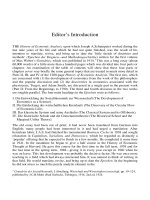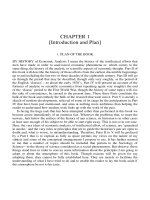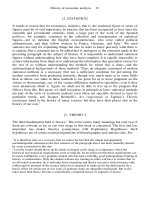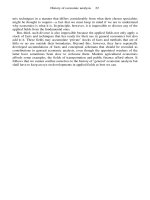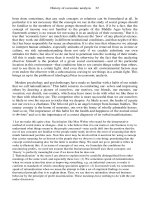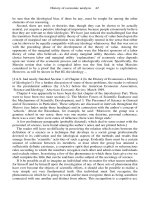History of Economic Analysis part 9 pdf
Bạn đang xem bản rút gọn của tài liệu. Xem và tải ngay bản đầy đủ của tài liệu tại đây (82.24 KB, 10 trang )
be sure that the ideological bias, if there be any, must be sought for among the other
elements of our reasoning.
Second, there are tools or theories that, though they can be shown to be actually
neutral, yet acquire a putative ideological importance because people erroneously believe
that they are relevant to their ideologies. We have just noticed the unchallenged fact that
the transition from the marginal utility theory of value to a theory of value based upon the
concept of marginal rate of substitution was ideologically neutral in the sense that either
can be shown to be equally compatible with any ideology whatsoever. But this was not so
with the preceding phase of the development of the theory of value. Among the
opponents of the marginal utility theory of value were the Marxist sponsors of a labor
theory of value who believed—as did many marginal utility theorists also—that the
choice between labor and marginal utility ‘explanations’ of economic value depends
upon our vision of the economic process and is ideologically relevant. Specifically, the
Marxist notion that value is congealed labor was the first link in what Marxists
considered to be a proof that the source of all incomes except wages is exploitation.
However, as will be shown in Part III, the ideology…
[J.A.S. had nearly finished Section 1 of Chapter 4 (Is the History of Economics a History
of Ideologies?). For a further discussion of some of these problems, the reader is referred
to the presidential address (by J.A.S.) before the American Economic Association,
‘Science and Ideology,’ American Economic Review, March 1949.
Chapter 4 was apparently to have been the last chapter of the introductory Part. There
were to have been two more sections (2. The Motive Forces of Scientific Endeavor and
the Mechanisms of Scientific Development, and 3. The Personnel of Science in General
and of Economics in Particular). These subjects are discussed at intervals throughout the
History (see Index under these headings) and in connection with the author’s concept of
‘schools.’ About the Ricardians, for example, he said: ‘Moreover, the group was a
genuine school in our sense: there was one master, one doctrine, personal coherence;
there was a core; there were zones of influence; there were fringe ends.’
A few preliminary paragraphs (probably dictated), which deal to some extent with the
personnel of science, were found among the author’s notes and are printed below.]
The reader will have no difficulty in perceiving the relation which exists between the
definition of a science as a technique that develops in a social group professionally
devoted to its cultivation and the ideological aspects of the methods and results that
emerge from the ‘scientific’ activities of such a group. Evidently there must be a certain
amount of cohesion between its members, at least when the group has attained a
sufficiently definite existence, a corporative spirit that produces explicit or subconscious
rules according to which the members recognize each other and admit certain individuals
and exclude others. In noticing a few of the phenomena to which these facts give rise we
shall complete the little that can be said here on the subject of the sociology of science.
If it be possible at all to imagine an individual who no matter for what reason embarks
for himself and by himself upon the investigation of any of those sets of phenomena that
have ever become the objects of scientific efforts, it should also be possible to realize a
very simple yet very fundamental truth. Our individual must first recognize the
phenomena on which he is going to work and he must recognize them as being somehow
connected with one another and distinct from others. This recognition is a cognitive act.
History of economic analysis 42
But it forms no part of the analytic work. On the contrary, it supplies the object or
material on which analysis works and is therefore a prerequisite of it. The analytic work
itself then consists of two different though inseparable activities. The one consists in
conceptualizing the contents of the vision. By this we mean the fixing of its elements into
precise concepts that receive labels or names in order to retain their identity, and in
establishing relations (theorems or propositions) between them. The other consists in
hunting for further empirical data (facts) with which we enrich and check the ones
originally perceived. It stands to reason that these two activities are not independent of
one another but that there must be an incessant give and take between them. Attempts at
conceptualization invite the hunt for further facts and the new facts discovered must
themselves be inserted and conceptualized. In an endless sequence both activities
improve, deepen, and correct the original vision and also each other’s results. We do try
at any given stage of our scientific endeavors to construct schemata or systems or models
by which to describe as best we can the set of phenomena we are interested in, which are
then developed ‘deductively’ or ‘inductively.’ But they are provisional by nature and are
always relative to the stock of facts we command. This is indeed a very imperfect
description of scientific procedure but it brings out a fact that will be emphasized again
and again in these pages: there is not and there cannot be any fundamental opposition
between ‘theory’ and ‘fact finding,’ let alone between deduction and induction. It will be
one of our tasks to show why the appearance of such opposition has emerged
nevertheless.
In practice, of course, no scientific worker ever goes through all the stages of the work
beginning with an independent vision of his own. Intuitive perception of novel aspects is
indeed never absent so long as a science is really alive. But vision of the kind that
produces novel methods or propositions or else leads to the discovery of novel facts—
which then enter the science in the form of new hypotheses or restrictions—only adds to
and perhaps partly displaces existing scientific structures, the bulk of which is handed
from generation to generation as a matter of course. And practically always it isn’t
society as whole or even a random collection of members that hands on the stock of
scientific knowledge but a more or less definite group of professionals who teach the
rising generations not only their methods and results but also their opinions about the
direction and the means of further advance. In a majority of cases competence in doing
scientific work cannot be acquired, or can be acquired only by individuals of quite
exceptional originality and force, from any source other than the teaching of recognized
professionals. Let us briefly glance at some of the consequences of this fact.
First of all, it should be observed that this social mechanism is tremendously
laborsaving. By means of it any beginner who follows the advice received and who does
the work assigned to him acquires knowledge of facts, grasp of problems, mastery of
methods with an economy of energy that should set the bulk of his force free for
exploration of lands that lie beyond the boundary line at which the competence of the
teacher ends. There should be no reasonable doubt about it, therefore, that primarily the
social mechanism glanced at is not only favorable to the development of conceptual
apparatus and to the accumulation of factual knowledge but even that it supplies the most
potent motive power of what is usually referred to as scientific progress. Obviously,
however, there is also another side to the medal. Teaching in any established science
stereotypes the mind of the tyro and may stunt such originality as he may have. This has
The sociology of economics 43
another and less obvious consequence. Owing to the resistance that an existing scientific
structure offers, major changes in outlook and methods, at first retarded, then come about
by way of revolution rather than of transformation and elements of the old structure that
might be permanently valuable or at least have not yet had time to yield their full harvest
of result are likely to be lost in the process. There is thus plenty of justification, just as
there is for the resentments of the revolutionary, for the propensity of a certain type of
mind to emphasize continuity and to defend old insights against new ones. Many
examples of this will be noticed in this book.
Second, the fact that existing structures once established tend to persist accounts in the
field of scientific endeavor as it does in others for a phenomenon that is not easy to
explain, the phenomenon of ‘generations.’ Consider a population with constant age
distribution in which moreover the number of people that enter scientific vocations are
equal to the number of people who retire. A given profession, say the profession of
scientific economists, would then also display a constant age distribution. It is no doubt
possible to construct sub-groups whose outlooks and methods may be expected to
develop and there is no problem whatever in the antagonism of these age groups that we
might observe. But this is not the problem of scientific generations for we also observe
that at any given time a majority of the people in all the age groups display certain
similarities of attitude so that, for example, it is possible to speak of a generation of
1880–1900 and to contrast it with the generation of 1920–1940 although younger and
older men presumably differed in the first period as much as they did in the second.
There would be no point in this if change in methods and results proceeded at an even
rate. In the case of economists one might be tempted to explain this phenomenon by the
change in social and economic conditions and by the consequent change in the practical
problems that attracted attention in the two periods. But we find the same phenomenon in
sciences that work on invariant environments. It is precisely this which gives us the clue
to the nature of the problem and at the same time to its solution. Problems and methods
not only change because environments change. They also change in consequence of the
[fact that the] analytic work that is embodied in a given structure of a science has a way
of resisting change.
Third, the professionals that devote themselves to scientific work in a particular field
and even all the professionals who devote themselves to scientific work in any field tend
to become a sociological group. This means that they have other things in common
besides the interest in scientific work or in a particular science per se. In most cases they
teach the science which they are trying to bring up and to make their living by teaching.
Naturally, this will tend to evolve a social and economic type. The group accepts or
refuses to accept co-workers also for reasons other than their professional competence or
incompetence. In economics this grouping took long to mature but when it did mature it
acquired much greater importance than it did in physics. We shall see how in most
countries writers on economic topics hail from all the sectors of society. There were
indeed factors that made for grouping at an early time, the most important instance being
the Catholic scholastic doctors, but all the rest consisted of types that came from
anywhere in the scales of social rank or of income brackets. In England, this was so even
in the first half of the nineteenth century. In such cases we must use the word profession
with a proviso. In England there was at the time indeed a profession of economists in the
sense that there were writers on economic topics who mutually recognized their
History of economic analysis 44
professional competence. But later on the association of scientific work with teaching
produced an economic profession in a fuller sense of the word and this economic
profession developed attitudes to social and political questions that were similar also for
reasons other than similar scientific views. This similarity of conditions of life and of
social location produced similar philosophies of life and similar value judgments about
social phenomena. It would be unnecessary to dwell on the consequences of this were it
not for the fact that it was closely associated with the phenomenon of scientific schools.
Since this concept will inevitably play a considerable role in our story we had better stay
for a moment in order to investigate its meaning.
The sociology of economics 45
History of economic analysis 46
PART II
FROM THE BEGINNINGS
TO THE FIRST CLASSICAL
SITUATION
(TO ABOUT 1790)
CHAPTER 1
Graeco-Roman Economics
1. PLAN OF THE PART
IT HAS BEEN explained in Part I that no science, in the sense there defined, is ever
founded or created by a single individual or group. Nor is it in general possible to assign
any precise date to its ‘birth.’ The slow process by which economics, as we now call it,
rose into recognized existence ran its course between the middle of the seventeenth and
the end of the eighteenth centuries. However, a concept that has been introduced in Part I
may help us to be somewhat more precise, at least so far as the exigencies of exposition
are concerned: the concept of Classical Situations.
1
Such a classical situation emerged in
the second half of the eighteenth century and no such classical situation had ever emerged
before. Availing ourselves of this, we might be tempted to start somewhere between 1750
and 1800, perhaps with the peak success of that epoch, A.Smith’s Wealth of Nations
(1776). But every classical situation summarizes or consolidates the work—the really
original work—that leads up to it, and cannot be understood by itself. Therefore, we shall
try to cover in this Part, as best we can, the whole span of more than 2000 years that
extends from ‘beginnings’ to about twenty years after the publication of the Wealth of
Nations. This task is much facilitated by the further fact that, so far as the purposes of this
history are concerned, many centuries within that span are blanks.
The classical situation of the second half of the eighteenth century was the result of a
merger of two types of work that are sufficiently distinct to justify separate
1
[J.A.S. did not complete the sections of Part I in which he would have discussed his concept of
Classical Situations (and the difficulties inherent in periodizing) with special reference to his
reasons for arranging the subject matter of the history of economic analysis in the three main
divisions covered by Parts II, III, and IV. The reader will, however, find references to these
problems at intervals throughout this book, especially in Part III, ch. 1 and again in Part IV, ch. 1.
As J.A.S. points out, the term classic in this book has three meanings which should be distinguished
from one another. Formerly it referred to the economic literature of the period from Adam Smith to
J.S.Mill. ‘It retained this label until, at a time when the word “classic” had lost its eulogistic
connotation and was beginning to stand for “obsolete,” Lord Keynes used the word in order to
denote the teaching of A.Marshall and his immediate followers (or simply, pre-Keynesian
economics).’ J.A.S. himself uses the term Classical Situation to describe the achievement of
substantial agreement after a long period of struggle and controversy—the consolidation of the
fresh and original work which went before. When he wishes to use the term classic in the first sense
(Adam Smith to J.S.Mill), he puts it in quotes ‘to prevent confusion’ (Part III, ch. 1, sec. 1).]
consideration.
2
There was the stock of factual knowledge and the conceptual apparatus
that had slowly grown, during the centuries, in the studies of philosophers. And, semi-
independent of this, there was a stock of facts and concepts that had been accumulated by
men of practical affairs in the course of their discussions of current political issues. These
two sources of nascent economics cannot be separated strictly. On the one hand, there
were numerous intermediate cases that cannot be classified without cutting many a
Gordian knot. On the other hand, right into the time of the physiocrats, the scholar’s
technique was so very simple that most of it was within the reach of ordinary common
sense and easily rivaled by unlearned practitioners, whose writings, therefore, cannot be
dismissed as irrelevant to our purpose: on the contrary, they frequently rose to what we
call in this book the scientific level. Broadly, however, our distinction is valid all the
same.
Let us recall our distinction between Economic Thought—the opinions on economic
matters that prevail at any given time in any given society and belong to the province of
economic history rather than to the province of the history of economics—and Economic
Analysis—which is the result of scientific endeavor in our sense. The history of
economic thought starts from the records of the national theocracies of antiquity whose
economies presented phenomena that were not entirely dissimilar to our own, and
problems which they managed in a spirit that was, in fundamentals, not so very dissimilar
either. But the history of economic analysis begins only with the Greeks.
Ancient Egypt had a kind of planned economy that turned upon her irrigation system.
The Assyrian and Babylonian theocracies had huge military and bureaucratic
establishments and elaborate legal systems—of which the code of Hammurabi (about
2000 B.C.) is the earliest legislative monument; they pursued an activist foreign policy;
also they developed monetary institutions to a high degree of perfection, and knew credit
and banking. The sacred books of Israel, especially the legislative portions of them,
reveal perfect grasp of the practical economic problems of the Hebrew state. But there is
no trace of analytic effort. More than anywhere else we might expect to find such traces
in ancient China, the home of the oldest literary culture of which we know. We find in
fact a highly developed public administration that dealt currently with agrarian,
commercial, and financial problems. These problems are frequently touched upon,
mainly from an ethical standpoint, in the remains of Chinese classical literature, for
instance in the teaching of Kung Fu Tse (551–478 B.C.), who was himself at two stages
of his life a practical administrator and reformer, and of Mêng Tzû (Mencius, 372–288
B.C., works trans. by L.A. Lyall, 1932), from whose works it is possible to compile a
comprehensive system of economic policy. Moreover, there were methods of monetary
management and of exchange control that seem to presuppose a certain amount of
analysis. The phenomena incident to the recurrent inflations were no doubt observed and
discussed by men much superior to us in
2
Like periodization, the setting up of such types is an expository device. Though certainly based
upon provable facts, neither must be taken too seriously or else what is intended to be a help for the
reader turns into a source of misconceptions. Periods and types are useful only so long as this is
remembered.
Graeco-roman economics 49
cultural refinement. But no piece of reasoning on strictly economic topics has come down
to us that can be called ‘scientific’ within our meaning of the term.
3
The obvious inference is of course highly uncertain. There may have been analytic
work, the records of which failed to survive. But there is reason to suppose that there was
not much of it. We have seen before that commonsense knowledge, relative to scientific
knowledge, goes much farther in the economic field than it does in almost any other. It is
perfectly understandable, therefore, that economic questions, however important, took
much longer in eliciting specifically scientific curiosity than did natural phenomena.
Nature harbors secrets into which it is exciting to probe; economic life is the sum total of
the most common and most drab experiences. Social problems interest the scholarly mind
primarily from a philosophical and political standpoint; scientifically they do not at first
appear very interesting or even to be ‘problems’ at all.
[2. FROM THE BEGINNINGS TO PLATO]
So far as we can tell, rudimentary economic analysis is a minor element—a very minor
one—in the inheritance that has been left to us by our cultural ancestors, the ancient
Greeks. Like their mathematics and geometry, their astronomy, mechanics, optics, their
economics is the fountainhead of practically all further work. Unlike their performance in
these fields, however, their economics failed to attain independent status or even a
distinctive label: their Oeconomicus (
house, and νóµoς law or rule) meant only
the practical wisdom of household management; the Aristotelian Chrematistics (
possession or wealth), which comes nearest to being such a label, refers mainly to the
pecuniary aspects of business activity. They merged their pieces of economic reasoning
with their general philosophy of state and society and rarely dealt with an economic topic
for its own sake. This accounts, perhaps, for the fact that their achievement in this field
was so modest, especially if compared with their resplendent achievements in others.
Classic scholars as well as economists who rate it more highly think of that general
philosophy and not of technical economics. Also they are prone to fall into the error of
hailing as a discovery everything that suggests later developments, and of forgetting that,
in economics as elsewhere, most statements of fundamental facts acquire importance only
by the superstructures they are made to bear
3
See, however, E.D.Thomas, Chinese Political Thought (1927); S.Y.Ly, Les grands courants de la
pensée économique chinoise dans l’antiquité…(1936); and Huan Chang Chen, The Economic
Principles of Confucius and His School (1911).
History of economic analysis 50
and are commonplace in the absence of such superstructures. Such as they were, the
scientific splinters of Greek economic thought
1
that are accessible to us may be gleaned
from the works of Plato (427–347 B.C.) and Aristotle (384–322 B.C.).
Greek thought, even where most abstract, always revolved around the concrete
problems of human life. These problems of life in turn always centered in the idea of the
Hellenic city-state, the polis, which was to the Greek the only possible form of civilized
existence. Thus, by virtue of a unique synthesis of elements that with us dwell in different
worlds, the Greek philosopher was essentially a political philosopher: it was from the
polis that he looked into the universe, and it was the universe—of thought as well as of
all other human concerns—that he found reflected in the polis. The Sophists seem to have
been the first to analyze this universe very much as we do now: they are, in fact, the
forefathers of our own methods of thought, our logical positivism included. But Plato’s
aim was not analysis at all but extra-empirical visions of an ideal polis or, if we prefer,
the artistic creation of one. The picture he painted of the Perfect State in his Politeia (The
1
We are not concerned with economic conditions and with public opinion about them. But the
reader can with little trouble get an instructive glimpse of both from G.M.Calhoun, The Business
Life of Ancient Athens (1926). This book may also bring home to him, among other things, the
curious affinity that exists between our own reactions to business practice and those of the ancient
Greeks. The works of Greek poets and historians are relevant only from this standpoint and need
not be considered here though some of the latter, especially Thucydides and Polybius, are of
absorbing interest to any student of society. Nor is it necessary to discuss Xenophon, whose
Oeconomicus is precisely the sort of treatise on household management that went under similar
titles until the sixteenth century, and whose Poroi, a treatise on Attic public finance, is of course
very interesting for the economic historian (as is also the pseudo-Xenophontic treatise on the
Athenian commonwealth, the survivor of what may have been a large literature written mainly by
opponents of the radical regimes in post-Periclean Athens). Among ‘philosophers,’ Plato and
Aristotle are of such commanding importance that reference may be confined to them, in a sketch
like this. The huge literature about them naturally pays but little—and sometimes dilettantic—
attention to the topics that matter to us. The purposes of the general reader will be served
adequately by the perusal of M.L.W.Laistner, Greek Economics (1923), which also contains
translations of portions of representative works. See also Auguste Souchon, Les Théories
économiques dans la Grèce antique (1898). It seems, however, impossible not to mention such
classics as Fustel de Coulanges’ La Cité antique (12th ed. of the English trans. by W.Small, 1921);
T.Gomperz’ Griechische Denker (trans. by Magnus and Berry, 1901–12), and U.von Wilamowitz-
Moellendorp’s Staat und Gesellschaft der Griechen und der Römer (2nd ed., 1923)—masterly
pictures of the cultural backgrounds from which sprang, among so many more important things,
also the beginnings of economic analysis.
Graeco-roman economics 51



